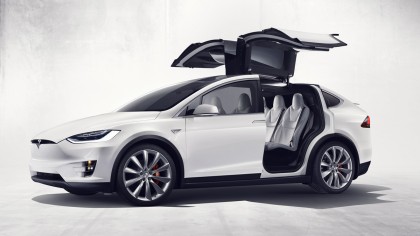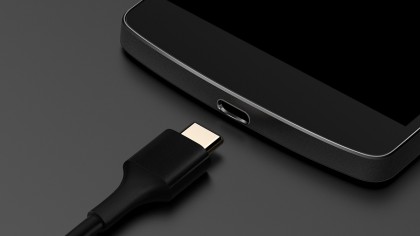Here are 5 consumer tech innovations that won 2015
While the technology is cutting edge, many app developers still need to work it into their software. This could be slow going until Apple incorporates the technology into its iPad lineup and other smartphone manufacturers release their own versions of 3D Touch. Still, 3D Touch offers developers a completely new control mechanisms to play with, and it could be especially useful in mobile gaming.

Tesla Model X
Legend has it that whenever Tesla and SpaceX CEO Elon Musk thinks of a new product, it will be the coolest thing on the planet (or so I've heard). That's so far been generally true, and between PayPal, the Hyperloop, the Falcon 9 rocket, and the Model S, we've seen some pretty groundbreaking technology from Musk and his companies.
This year, one of Musk's most notable releases was the Tesla Model X, a new family-sized, all-electric car complete with falcon wing doors and a high level of safety.
Those falcon wing doors allow car riders to open them in extremely tight spaces. The doors are also big, so drivers and passengers can easily access the second and third rows of seats - perfect for families who might need to strap in a young child.
The Model X is cutting-edge in a number of ways, not least of which being that it's the first all-electric SUV. Larger cars are often associated with higher emissions, but the Model X proves that not only does this not have to be true, but also that drivers don't have to sacrifice power by buying electric. In fact, the Model X is so powerful, that it's the first tow-capable electric car, and while it's towing will probably reduce the vehicle's range and power, that it can handle towing is a big step forward.
According to Tesla, the Model X is also the world's cleanest SUV, and even has a "biohazard" button, which activates the air filtration system and is said to offer "medical-grade" air through this system.
Tesla wasn't just shaking up the car industry when it came to creating the first electric SUV. Safety was also a big concern in developing this vehicle, and it paid off: the Model X won five stars in every car safety-rating category. There's only a 6.5% chance of injury in a high-speed collision for drivers of the Model X, which are some reassuring odds.
Sign up for breaking news, reviews, opinion, top tech deals, and more.
The Tesla Model X comes in two models - the 90D and the P90D. The 90D can go from 0 to 60 mph (97kph) in only 3.7 seconds and has a range of 257 miles, or 413 km. It costs $132,000 (about £89,036, AU$182,608). The P90D, however, is the fastest accelerating SUV in the world, and comes equipped with the same Ludicrous Mode found in the Model S. This will get you from 0 to 60mph in 3.2 seconds. It costs $142,000 (about £95,781, AU$196,442).

USB Type-C
Sure, USB Type-C was developed before 2015, but this was the year the standard finally took off, replacing others as the faster and slimmer option for your favorite devices. It also means you'll never try to plug in your USB device the wrong way again.
While it's important to note that USB-C itself is simply a shape, the majority of companies implementing it will also use USB 3.1 - the standard that USB-C is most often associated. USB 3.1 offers much faster data speeds than its predecessors (up to 10Gbps), which is more than enough to transfer 4K movies in a matter of seconds from one device to another.
Not only that, but USB Type-C also brings much faster charging speeds than USB 3.0 and 2.0. Whereas older standards will have you wait hours for a full charge, the new USB Power Delivery specification that is most often used in USB-C enables the delivery of up to 100 Watts, meaning your device will juice up much more quickly than it did before. Not only that, but the new connector supports two-way charging, meaning you can connect one USB-C supported phone, and one phone will charge the other.
Christian is a writer who's covered technology for many years, for sites including Tom's Guide, Android Central, iMore, CNN, Business Insider and BGR, as well as TechRadar.